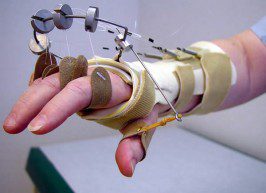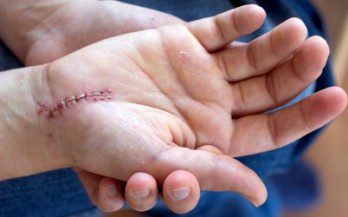Nerves conduct electrical impulses through the body to provide feeling to the skin and power to muscles. There are three main nerves in your arm and hand that start at the spinal cord and travel through the shoulder down to your hand. These are peripheral nerves named the median, radial and ulna nerves.
Peripheral nerves are susceptible to different types of injury; from simple compression and stretching injuries, through to severe lacerations that create extensive nerve problems. When a nerve is compressed or injured there is reduced blood flow which causes pain, changes to sensation such as tingling, pins and needles or numbness and weakness or lack of dexterity. Nerves can get compressed as they pass through small tunnels in the arm, elbow and wrist. Correct diagnosis is essential to ensure that you receive the right treatment. If treatment is delayed the amount of recovery you can expect may be reduced and rehabilitation may take longer.
Find one of our hand clinics near you.
We have clinics in Merivale, Papanui, Moorhouse Ave, Halswell and Kaiapoi
Nerve Conditions
Hand therapy for nerve conditions starts with an assessment to determine which nerve is involved, where it is compressed or injured and the severity of the damage. Your hand therapist will discuss the best treatment plan which will involve resting the nerve to reduce compression, nerve mobilising exercises, pain management and advice to help prevent the injury from happening again. Some nerve injuries will require referral to a surgeon which your hand therapist can arrange. Hand therapy after surgery is important to restore movement and strength. Read more below and see our information sheets and resources for more details about common nerve conditions and how they are treated.
The most common nerve injuries we treat are:
- Carpal Tunnel Syndrome – compression of the median nerve at the wrist with tingling or numbness of the thumb, index and middle fingers and/or pain in the wrist. Symptoms are often felt at night and during the day with certain activities. You may feel weak in the hand and/or drop things.
- Cubital Tunnel Syndrome – compression of the ulnar nerve at the elbow which causes reduced sensation, tingling or numbness in the little and ring fingers. Symptoms can be worse at night or when you rest on your elbow or have it bent for a long time.
- Radial Nerve Palsy – compression of the radial nerve in the upper arm which causes weakness in the muscles that straighten the wrist and fingers.
- Posterior Interosseous Nerve Syndrome – compression of the radial nerve in the forearm which causes deep, constant ache in the forearm.
- Nerve laceration and repair – the muscles and sensation affected will depend on where the nerve is lacerated. Nerves can regenerate at 1mm per day. The full extent of recovery is often unknown until 2 years after the injury.
- Neurological splinting – Changes in muscle tone can occur when the brain or spinal cord is injured, commonly after a stroke, head or spinal injury, or with cerebral palsy. Hand therapists can make individualised splints and provide exercises to maintain joint range and reduce risk of contractures. We like to work alongside your carers and occupational therapists to ensure we get the right solution for your needs.
Nerve Condition FAQs
For more information and to book an appointment, please get in touch!
There are three nerves that usually cause tingling and numbness in the fingers. When a nerve is compressed or injured there is reduced blood flow which causes pain and sensory changes. Nerves can get compressed as they pass through small tunnels in the arm, elbow and wrist. Which fingers are affected will help determine the diagnosis.
Carpal tunnel syndrome usually causes tingling or numbness of the thumb, index and middle fingers and/or pain in the wrist. Symptoms are often felt at night and during the day with certain activities. You may feel weak in the hand or drop things.
Treatment requires wrist splints in a neutral position for night and sometimes day, tendon and nerve mobilising exercises and activity modification advice. See our information sheet for more details.
Nerves regenerate at 1mm per day. It can take many months for nerve injuries to heal and the full extent of recovery is often unknown until 2 years after the injury.
Information Sheets
These information sheets include more details about particular conditions and how they are treated.
You are in good hands with our team.
We would love to hear from you.
Merivale Hand Clinic
Resource hub
Visit our Resource hub for more informative articles and usefull factsheets.

Radial Nerve Palsy Splinting
While in Fiji, Jo and Nicky were able to share some splinting expertise with the Fijian therapists as they prepared to splint a patient with

Recovery Milestones for Carpal Tunnel Release Surgery
Carpal tunnel syndrome is a common nerve compression condition estimated to affect between 3 – 6% of the population. It may be up to three

Gestational Carpal Tunnel Syndrome
Swelling is one of the most common symptoms of pregnancy. Patients often notice swelling in their ankles and feet, but for some women, swelling occurs
Rehabilitation Of The Wrist And Elbow
For any questions contact us
Our team of 12 hand therapists have undergraduate degrees in physiotherapy or occupational therapy and have all completed a post graduate qualification in hand and upper limb therapy. Together we have a total of over 150 years of experience in hand therapy!